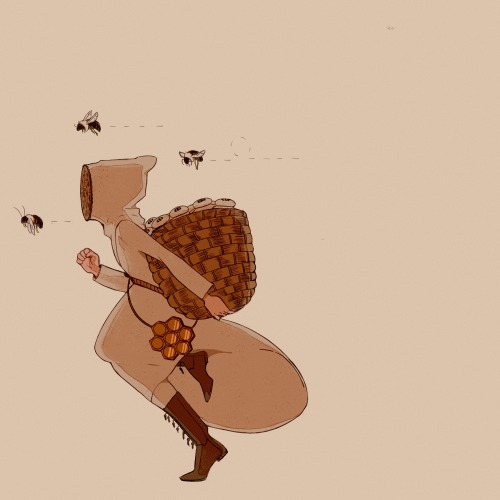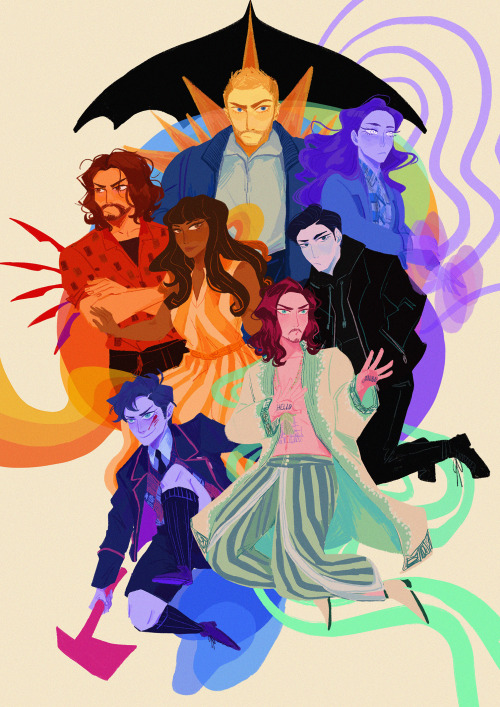“Thou Fool. No Living Man May Hinder Me! ” ⚔️

“Thou fool. No living man may hinder me! ” ⚔️
More Posts from Michelle-ish and Others


early modern beekeeper & plague doctor but make it cute
prints / insta / twitter
I don't know if any of you had the same experience as me, but I tried therapy when I was a teenager living in an abusive household and thought it was a waste of time. Ultimately my biggest problems (dad) were beyond my control and no amount of coping would make them better. Now that I'm an adult with actual control over my life and don't live with my dad anymore therapy is MUCH more helpful.
If any of you had bad experiences with therapy when you were younger it may be worth it to try again now.
One time my rabbi told us, “imagine you had a box with a little bit of god in it. What would you do with the box?”
So we were like ?? “We’d protect it and keep it nice and clean and polished” and he was like “your body’s that box. Stop eating markers”

Totally not giving into the impulse of redesigning the Avengers as teens....
I don’t know who this is, but he’s made my day.
























What she says: I’m fine.
What she means: I understand the Chronicles of Narnia was at its heart a fairytale with theological analogies for children. But why did Lewis never address how they had to adapted to life on Earth again. Why does no one talk about how the Pevensies had to grow up with a kingdom of responsibilities on their shoulders, only to return to Earth and be children. Take Lucy, she was youngest and perhaps she adapted more quickly-but she had the memories and mind of a grown woman in an adolescent body. Edmund literally found himself in Narnia, he went from a selfish boy to mature and experienced man. He found a purpose and identity through his experiences to come back as just Edmund, Peter’s younger brother. Did people wonder why the sullen, sour boy came back, carrying himself like a wisened king? Did his mother wonder why he and Peter suddenly got along so well, why they spent so much time together now? And Susan, the girl of logistics and reason came back with a difference in her. She learned how to be a diplomat and ambassador, Susan the Gentle had to live to endure not-so-gentle circumstances. She had the respect she wanted, only to be just another teen girl. And Peter, he entered the manhood and maturity he so wanted. He earned the responsibility and stripes he yearned for. He learned to command armies and conduct the menial tasks demanded of a king to rule a nation. But he came back, appearing to be just anther glory-hungry boy. Not to mention the PTSD they must have struggled with. Especially Edmund. How often did he wake up in a sweat, screaming a sibling or comrade’s name? His parents believe it’s the war, but it’s an entirely different one he has nightmares about. How often did he have trouble with flashbacks and mood swings? And how many times did he and Peter sit over a newspaper or near the radio listening to reports on the troops. How often did they pour over lost battles and debate better strategies. Did their parents ever wonder why they seemed to understand flight war so well? How long was it before they stopped discussing these things in front of people? Why does no one talk about this???
-
 thesewickedwonders liked this · 1 month ago
thesewickedwonders liked this · 1 month ago -
 miniinimoni liked this · 2 months ago
miniinimoni liked this · 2 months ago -
 amaryllisblackthorn liked this · 2 months ago
amaryllisblackthorn liked this · 2 months ago -
 duchessie reblogged this · 2 months ago
duchessie reblogged this · 2 months ago -
 odette69 liked this · 2 months ago
odette69 liked this · 2 months ago -
 belavielle liked this · 3 months ago
belavielle liked this · 3 months ago -
 existentialcrisisetcetera reblogged this · 3 months ago
existentialcrisisetcetera reblogged this · 3 months ago -
 tryingtodobetter liked this · 4 months ago
tryingtodobetter liked this · 4 months ago -
 hellyeahniccage liked this · 4 months ago
hellyeahniccage liked this · 4 months ago -
 esperjester reblogged this · 4 months ago
esperjester reblogged this · 4 months ago -
 esperjester liked this · 4 months ago
esperjester liked this · 4 months ago -
 sisiglover69 reblogged this · 4 months ago
sisiglover69 reblogged this · 4 months ago -
 sisiglover69 liked this · 4 months ago
sisiglover69 liked this · 4 months ago -
 czapeczkadziadygi liked this · 4 months ago
czapeczkadziadygi liked this · 4 months ago -
 kittykaibasblog reblogged this · 4 months ago
kittykaibasblog reblogged this · 4 months ago -
 kittykaibasblog liked this · 4 months ago
kittykaibasblog liked this · 4 months ago -
 bunnycrownw liked this · 5 months ago
bunnycrownw liked this · 5 months ago -
 netmors liked this · 5 months ago
netmors liked this · 5 months ago -
 liwaletheia liked this · 6 months ago
liwaletheia liked this · 6 months ago -
 valmartii01 liked this · 6 months ago
valmartii01 liked this · 6 months ago -
 scarletvisionss reblogged this · 6 months ago
scarletvisionss reblogged this · 6 months ago -
 zuzspa03 liked this · 6 months ago
zuzspa03 liked this · 6 months ago -
 chadsuke reblogged this · 7 months ago
chadsuke reblogged this · 7 months ago -
 laschinasbiencaguais liked this · 7 months ago
laschinasbiencaguais liked this · 7 months ago -
 the-dreaming-plastic-dinosaur liked this · 7 months ago
the-dreaming-plastic-dinosaur liked this · 7 months ago -
 annalysa liked this · 7 months ago
annalysa liked this · 7 months ago -
 birdbrainsoup liked this · 7 months ago
birdbrainsoup liked this · 7 months ago -
 allbycharles reblogged this · 7 months ago
allbycharles reblogged this · 7 months ago -
 allbycharles liked this · 7 months ago
allbycharles liked this · 7 months ago -
 joyfuljourneyss liked this · 7 months ago
joyfuljourneyss liked this · 7 months ago -
 joyfuljourneyss reblogged this · 7 months ago
joyfuljourneyss reblogged this · 7 months ago -
 mellowenthusiast2299 reblogged this · 7 months ago
mellowenthusiast2299 reblogged this · 7 months ago -
 mellowenthusiast2299 liked this · 7 months ago
mellowenthusiast2299 liked this · 7 months ago -
 camille-lachenille reblogged this · 7 months ago
camille-lachenille reblogged this · 7 months ago -
 elizabethkawaii17 liked this · 7 months ago
elizabethkawaii17 liked this · 7 months ago -
 porcelain-needle liked this · 8 months ago
porcelain-needle liked this · 8 months ago -
 aro-kai liked this · 8 months ago
aro-kai liked this · 8 months ago -
 seams-and-stress reblogged this · 8 months ago
seams-and-stress reblogged this · 8 months ago -
 seams-and-stress liked this · 8 months ago
seams-and-stress liked this · 8 months ago -
 seafrost-fangirl reblogged this · 8 months ago
seafrost-fangirl reblogged this · 8 months ago -
 seafrost-fangirl liked this · 8 months ago
seafrost-fangirl liked this · 8 months ago -
 blog--witch liked this · 8 months ago
blog--witch liked this · 8 months ago -
 mummelthecryptid reblogged this · 8 months ago
mummelthecryptid reblogged this · 8 months ago -
 joulupuuro reblogged this · 8 months ago
joulupuuro reblogged this · 8 months ago -
 fireintheflames reblogged this · 8 months ago
fireintheflames reblogged this · 8 months ago -
 rivenantiqnerd reblogged this · 8 months ago
rivenantiqnerd reblogged this · 8 months ago -
 rivenantiqnerd liked this · 8 months ago
rivenantiqnerd liked this · 8 months ago -
 lesuerts liked this · 9 months ago
lesuerts liked this · 9 months ago


